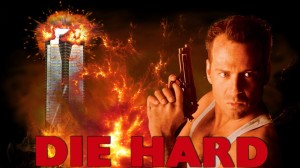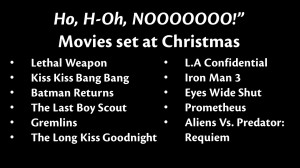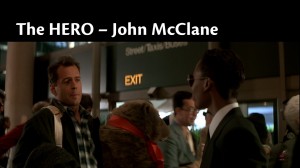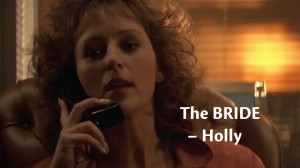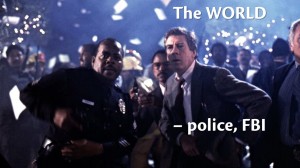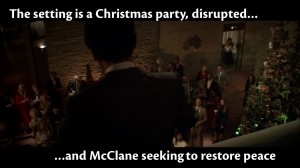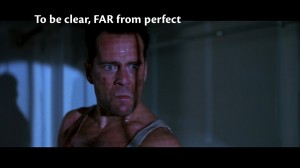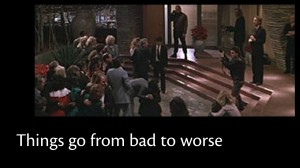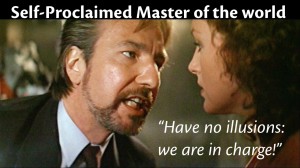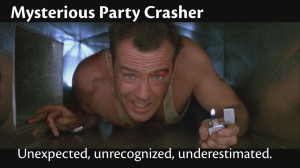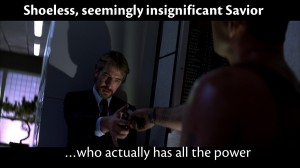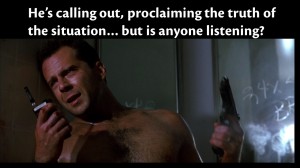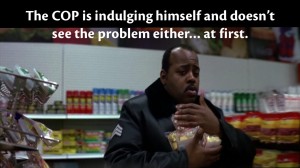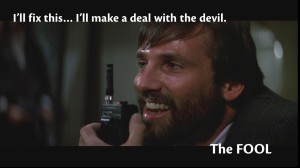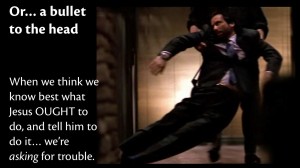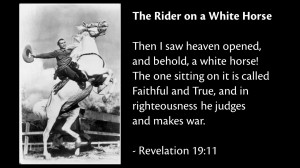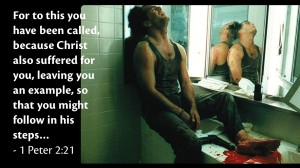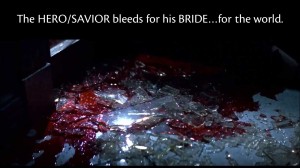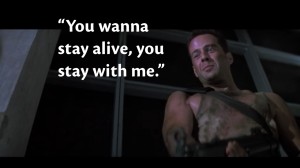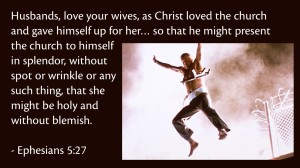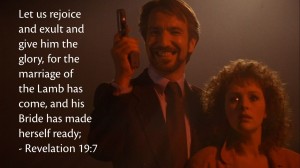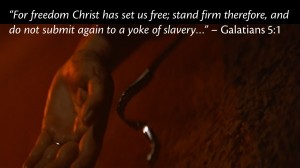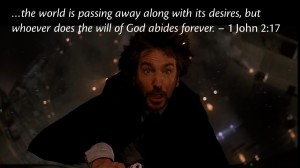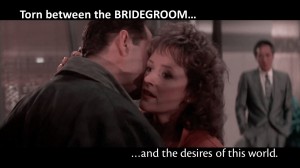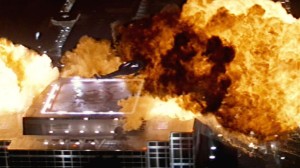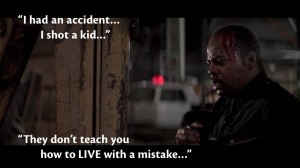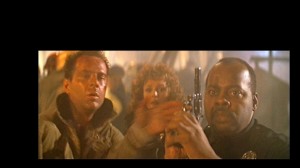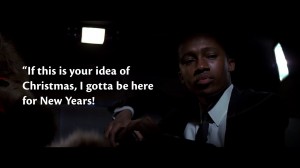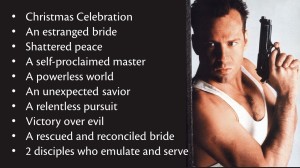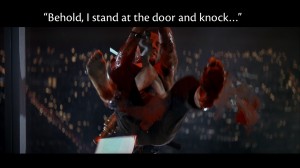John McClane, officer of the NYPD, tries to save wife Holly and several others, taken hostage by German terrorist Hans Gruber during a Christmas party at the Nakatomi Plaza in Los Angeles. While it’s not what some of you would immediately correlate with Yuletide cheer, Die Hard actually works quite well as a Christmas film… and a film that teaches and preaches some surprising parallels with truth.
Philip Yancey’s book “Finding God in Unexpected Places” says the following:
“For those with eyes to see, traces of God can be found in the most unexpected places. Yet many Christians have not only missed seeing God, they’ve overlooked opportunities to make him visible to those most in need of hope… [we need to] look beyond the obvious, pointing out glimpses of the eternal where few might think to look.”
I was blessed to give a special message on this film as part of a Christmas series, and you can watch the video here. A written version of the review follows below.
There are actually a lot of movies set at Christmas: some of them might surprise you…
Many of director Shane Black’s film’s are set at Christmas and according to him:
“Christmas is fun. It’s unifying, and all your characters are involved in this event that stays within the larger story. It roots it, I think, it grounds everything,” he told the lovely folk at Den of Geek. “At Christmas, lonely people are lonelier, seeing friends and families go by. People take reckoning, [they take] stock of where their lives are at Christmas.”
What makes Die Hard a “Christmas film? We’re introduced to a hero (McClane) that seems like the “every-man”…
…and a side character we meet is the limo driver Argyle. He’s inquisitive, finds McClane intriguing, offers to wait while John talks to his wife, and he finds himself locked in the basement of the building when the hostage crisis begins.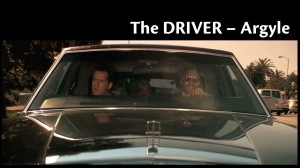
The hero’s wife (Holly) is working for the Nakatomi corporation. She Finds herself amidst the captors when her little slice of the world becomes enslaved to the villain and his men.
Holly finds herself alongside a cocaine-fueled idiot co-worker named Ellis… NOT the person you want to be saddled next to in a crisis.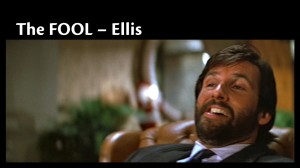
And then there’s the cop, Al Powell. As the film moves into the second act, he arrives on the scene… comes into the story late, interacts with the hero, then supports him and believes in him when no one else does.
The authorities that show up – police, FBI, we’re just going to call them “the world”
- They don’t believe there’s a problem,
- Then they underestimate the problem,
- They don’t know how to handle the problem
- They’re powerless to fix it.
And then.. there IS a pretty powerful villain. That’s not Snape, or the sheriff of Nottingham, it’s Hans Gruber – the theatrical debut of Alan Rickman as a savvy, efficient, merciless thief. He’s a liar as well.
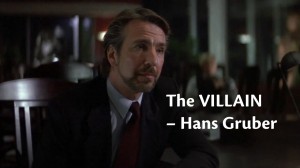
These are our themes, these are our archetypes, and I’m going to help you see how they not only parallel a wealth of our fictions and fantasies, but they also have some definitive fulfillment in scripture.
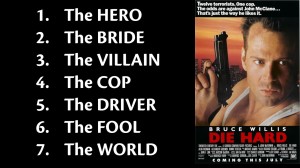 What should be a joyous celebration at the top of a skyscraper – a celebration in the sky – is cast into darkness.
What should be a joyous celebration at the top of a skyscraper – a celebration in the sky – is cast into darkness.
As Bill Murray said in Scrooged, Christmas represents the world as we’d like it: “For a couple of hours out of the whole year, we are the people that we always hoped we would be!”
But this is not the Christmas party any of us would want – in fact, it’s being held hostage. It’s wrecked, it’s ruined – something is wrong with this assemblage of mankind. If the tower represents mankind’s hopes and dreams, then as Morpheus said to Neo in the Matrix – “there’s something wrong with the world”.
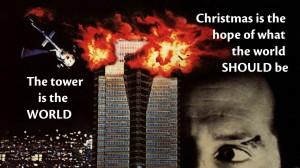 Now technically, our hero – our archetype – isn’t perfect either. No hero analogy is absolute: even Aslan in the Chronicles of Narnia, for all his Christ-like qualities, isn’t a perfect fit. In fact, when he thinks he’s going to die he leaves a message with Al… he apologizes for not being respectful, in a human-to-human level we can critique attitudes as sexist and more. But yet many still feel there’s something AMAZING about this film, and I think there’s a higher reason for that.
Now technically, our hero – our archetype – isn’t perfect either. No hero analogy is absolute: even Aslan in the Chronicles of Narnia, for all his Christ-like qualities, isn’t a perfect fit. In fact, when he thinks he’s going to die he leaves a message with Al… he apologizes for not being respectful, in a human-to-human level we can critique attitudes as sexist and more. But yet many still feel there’s something AMAZING about this film, and I think there’s a higher reason for that.
To do that we have to lift our eyes higher.
John and Holly are estranged: the Hero and Bride have broken relationship. She’s put worldly pursuits ahead of them. On her office door it says Genarro – she’s gone back to her maiden name, her old life… she no longer claims his name.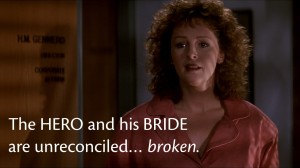
So the first thing we realize is that a husband and wife – bride and bridegroom… are BROKEN.
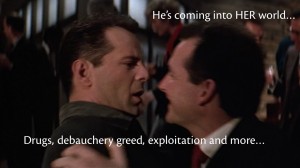
She’s estranged from and left her husband to pursue the things of the world – represented by her ROLEX, expensive material possession often equated with excess. She even feels guilty about it – when the slimy Ellis tells her to show it to John, she’s embarrassed.
Then, that world literally becomes a trap she finds herself imprisoned in when it should be Christmas – there is no joy and peace. A self proclaimed master says he’s in control, everyone will do as he instructs.
He was a murderer from the beginning, and does not stand in the truth because there is no truth in him Whenever he speaks a lie, he speaks from his own nature, for he is a liar and the father of lies. – John 8:44
In their case the god of this world has blinded the minds of the unbelievers, to keep them from seeing the light of the gospel of the glory of Christ, who is the image of God. – 2 Cor. 4:4
Now is the judgment of this world; now will the ruler of this world be cast out. – John 12:31
Fortunately, there is a mysterious party crasher… unexpected, unrecognized, and underestimated. They may have the bombs, but HE has the detonators. The villains, the self-proclaimed “masters” of the world that is the tower… truly have no power apart from him.
Although a shoeless savior – with nothing but the clothes on his back – he is seemingly “birthed” from the building’s ventilation system. While the authorities of the world can’t do anything to help with the situation, this unexpected hero arrives in their midst.
He’s calling out, proclaiming the truth of the situation… but is anyone listening?
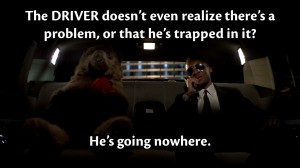 Meanwhile, downstairs the DRIVER doesn’t even realize there’s a problem, or that he’s trapped in it! He’s going nowhere.
Meanwhile, downstairs the DRIVER doesn’t even realize there’s a problem, or that he’s trapped in it! He’s going nowhere.
The COP is indulging himself and doesn’t see the problem either… at first.
Al is your typical American – overeating, kind of checked out, but he half-heartedly responds to a call and checks out the tower. The irony is he’s singing happily, but he’s singing “the weather outside is frightful”… when our Hero John, in a life-or-death struggle, sends a body through the window and raining down on Al’s police car.
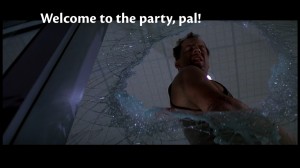
The weather outside is frightful, indeed. John opens Al’s eyes to the frightful reality they are in.
Unfortunately, the rest of the world doesn’t get it. The police dispatcher doesn’t really believe John when she sends Al… The deputy police chief sees there’s a problem, but doesn’t believe John: he doesn’t see the magnitude of it, or the nuance of it. He thinks he can fix it with his own mind, his own means, his own resources. The FBI thinks so as well.
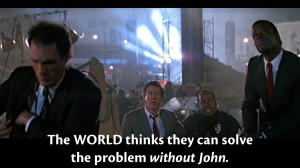
- They assume John is either in league with the badguys, or a nutcase.
- The real savior of our real story was accused of the same thing.
The world things they can solve the problem without McClane: this is epitomized by ELLIS… oh yeah, we come BACK to the fool. He literally uses the language of making a deal with the devil. That gets him exactly what he needs, right?
When we think we know best what Jesus OUGHT to do, and tell him to do it… we’re asking for trouble.
Now as we turn to look at the villain, he’s upset because he doesn’t understand the hero, and consistently underestimates him. As they banter back and forth, McClane compares himself to Roy Rogers: he’s the hero riding in on the white horse:
Not only does he resemble a classic savior character, he literally walks on broken glass to go the distance, suffering to save. It’s a classic example of Christus exemplar:
Someone has suffered for us… bled for us… died for us… obtained a salvation we could not have done by ourselves. We can’t duplicate that, but we are called to be shadows, reflections in smaller part…
Christ is the savior none of us could be, but he is example for us to imitate nonetheless.
We can serve and save people in lesser ways, just not the ultimate. That has been accomplished.
Back to our film, we see McClane show up and use one of the classic lines about how we need to cling to our hero and savior. Like Kyle Reese in the Terminator and others, you’re only going to stay alive if you heed their word, go with them… if you truly want to live.
Some of you already see the imagery at play here, and if we take it above the machismo of man and elevate the context we see the hero coming for his bride.
We see, with action and explosions, a little parallel of Christ and the church.
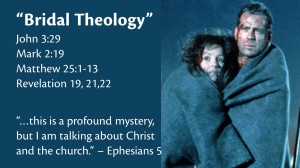
Christ and his church are likened to bridegroom and bride.
- In John 3, John the Baptist describes himself as a “friend of the bridegroom”.
- Jesus calls himself the bridegroom mark 2
- Matthew recounts Jesus’ parable where he uses the idea of pure women waiting for bridegroom
- In Revelation, the “marriage of the lamb” is described – Jesus = lamb, God’s people adorned = bride.
- Old testament idolatry is likened to adultery – cheating on a spouse, cheating on God.
We keep putting ourselves in danger like Holly, like a Lois Lane who then gets saved by her Superman, or in this case a John McClane…
For your Maker is your husband—the Lord Almighty is His name—the Holy One of Israel is your Redeemer; He is called the God of all the earth. – Isaiah 54:5
Forsaking Christ’s name and calling ourselves Genarros… we are separated. But He keeps pursuing, overthrows the world and the devil… and His kingdom is ushered in when he breaks the corruption and sin of this world. Christ brings in final victory… and our feast in the kingdom to come is likened to a wedding feast in all its grandeur.
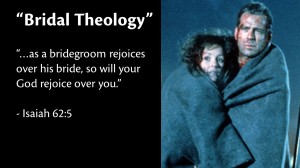
As the film reaches it’s climax… John McClane defeats Hans Gruber, who stumbles backward… but he’s determined to hang on to Holly Genarro, or take her with him. He is LITERALLY hanging on by her ROLEX…
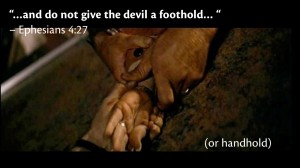
…and McClane reaches down, undoes the clasp, unshackles it from her wrist…
…and she’s set free.
Are we torn between the holy bridegroom and the desires of this world?
2 Peter says “the heavens will pass away with a roar and the elements will be destroyed with intense heat, and the earth and its works will be burned up.” And so (necessarily) there are explosions…
Revelation 21:4 says “He will wipe away every tear from their eyes; and there will no longer be any death; there will no longer be any mourning, or crying, or pain; the first things have passed away.” That’s the conflagration and consummation we’re yearning for with all these stories. That’s the promised coming of Christ that Christmas represents, moving then to the cross, resurrection, and blessed expectation of his second coming.
There are two other moment of victory and change. The cop, Al, would LOVE to be a hero like John McClane. We find out WHY he’s kind of a defeated cop, a desk jockey. He couldn’t pick up his gun anymore… couldn’t do his job. He needed healing from past trauma, the stains of his past.
Here we see the “christus exemplar” at work: when trouble comes in a post-climax villain attack, Al responds… instinctively… and stops the villain. He’s been healed… restored! He imitates John, takes down the badguy… and we see the first disciple of the gospel of John:)
A second disciple is Argyle, who rams the limo into an escaping badguys’ van… then pulls up to give McClane a ride off into a sunset. He’s prepared to imitate and serve his hero, the savior of the story. And so…
-
We see a reconciled bride.
-
A healed disciple.
-
A willing servant.
- Are we ignorant Argyles?
- Are we broken Al Powells?
- Are we estranged Hollys?
- Are we foolish Ellises?
- Are we arrogant Grubers?
Doesn’t matter: in the gospel, we can all repent…
“Those whom I love, I reprove and discipline, so be zealous and repent. Behold, I stand at the door and knock. If anyone hears my voice and opens the door, I will come in to him and eat with him, and he with me. The one who conquers, I will grant him to sit with me on my throne, as I also conquered and sat down with my Father on his throne.” – Revelation 3:19-21
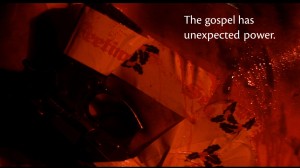 The gospel comes with power. The battle is won, the screenplay is written. The nativity is not a wish for peace, it’s a promise. That little baby grew up to be conquering hero. The cross on Jesus’ back was not a loss – it was the key to victory. Like a gun strapped to a bloody back – sin was atoned for. Death and Satan and Sin were conquered. Victory and happily ever after WAS secured by the real action hero.
The gospel comes with power. The battle is won, the screenplay is written. The nativity is not a wish for peace, it’s a promise. That little baby grew up to be conquering hero. The cross on Jesus’ back was not a loss – it was the key to victory. Like a gun strapped to a bloody back – sin was atoned for. Death and Satan and Sin were conquered. Victory and happily ever after WAS secured by the real action hero.
Yippe ki-yay, Merry Christmas.
